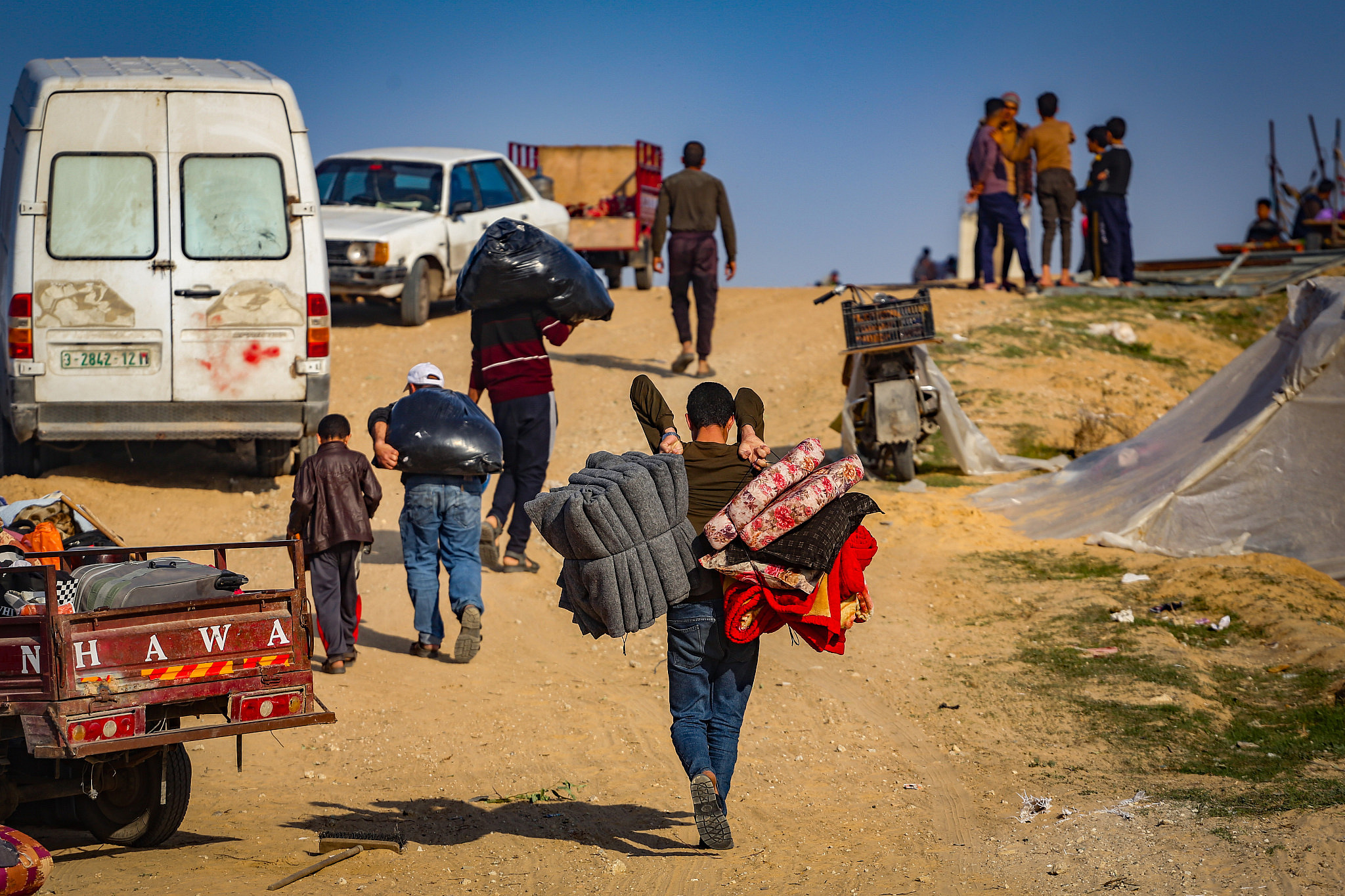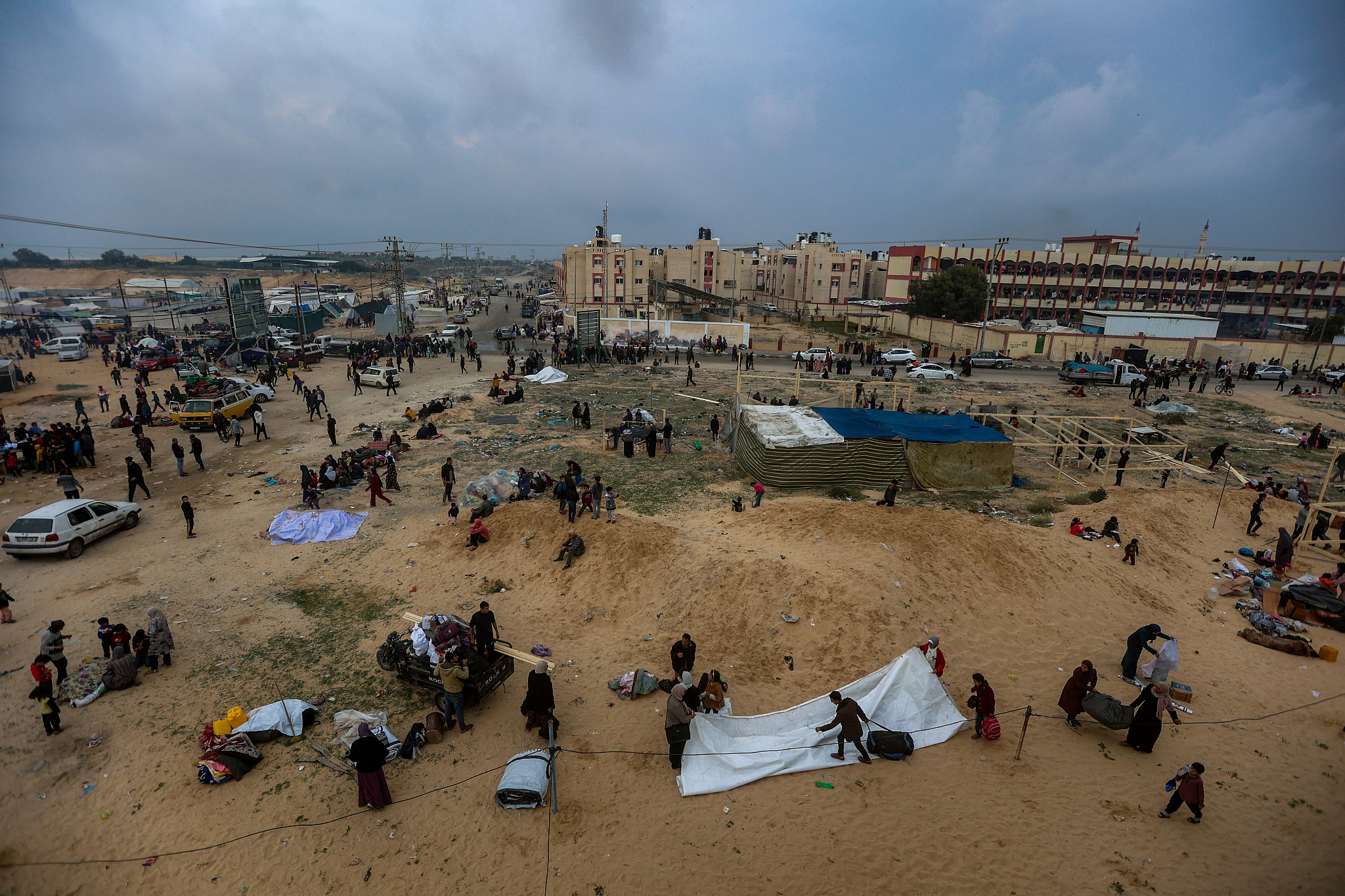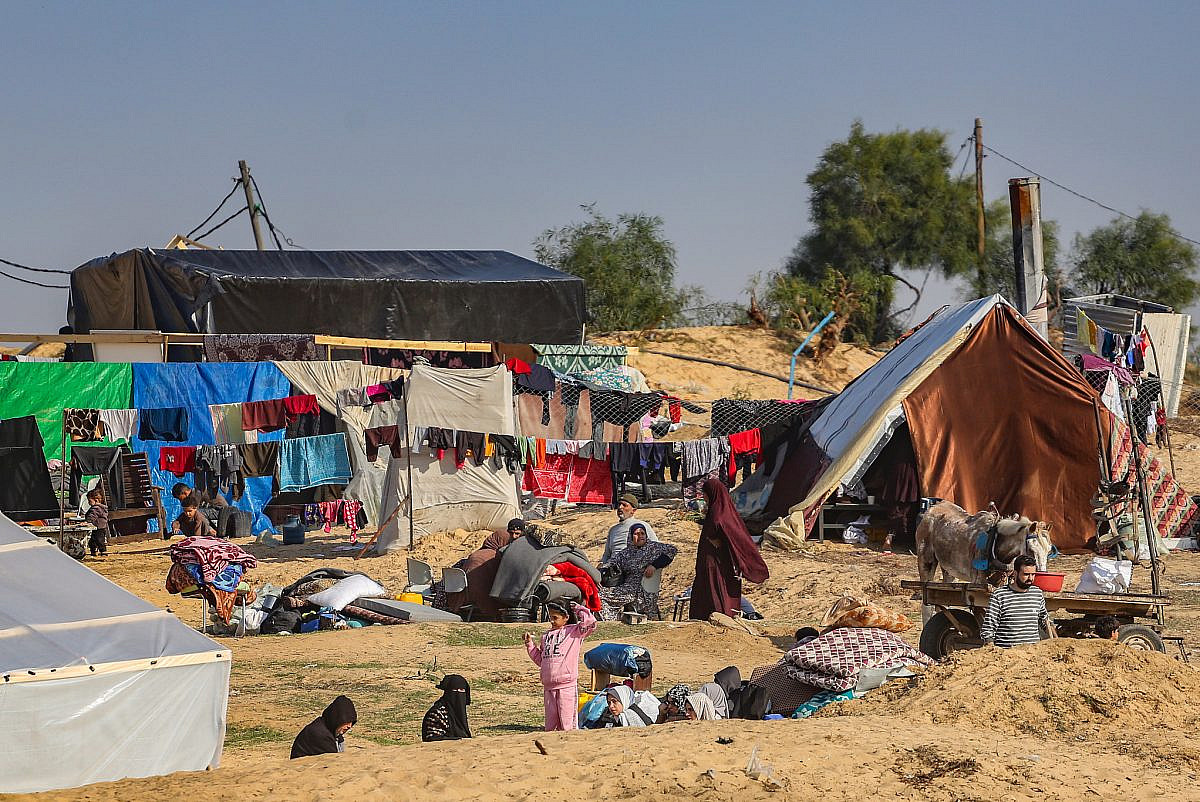Al-Mawasi is a narrow strip of coastal land in Gaza, one kilometer wide and fourteen kilometers long, stretching from the city of Khan Younis to the southernmost city of Rafah. Before the war, the area was home to over 6,000 residents, mostly Palestinian Bedouin families, who primarily relied on farming and fishing along the seaside; but otherwise, the land was largely empty and unutilized.
Now, however, Al-Mawasi has been transformed into a densely populated area, filled with hundreds of thousands of Palestinians fleeing Israel’s raging war on the besieged Strip, stranded in the winter cold and lacking the most basic necessities of life.
Since early December, Israel has called on Palestinians to evacuate approximately 20 percent of the land area of Khan Younis, which before the war was inhabited by more than 620,000 people, according to the UN. This was in addition to Israeli orders, issued in mid-October, for over 1 million people in the north of the Strip to evacuate south of Wadi Gaza (Gaza Valley), leading to mass displacement from places like Gaza City and Jabalia refugee camp.
But the residents displaced to Al-Mawasi, which was designated by Israel as a humanitarian zone, did not find any shelter or infrastructure there. Instead, they were left to find an empty area where they could pitch a tent, waiting out the fighting and staving off the increasingly cold weather. All the while, the masses of people arriving in this small area are growing.
It was not possible to confirm the exact number of people who have moved to Al-Mawasi in recent weeks, but the figure is estimated at around 300,000. Nearly 85 percent of the Gaza Strip’s population — about 1.9 million people — have been displaced from their homes since October 7.

Muhammad Sadiq, 36, lived in the city center of Khan Younis before the war, but recently fled to Al-Mawasi. “We thought that our area [in Khan Younis] was safe,” he said. “We did not leave our house during past wars. But we were shocked by the Israeli army’s order to evacuate from there. I expected that the evacuation would be for the eastern parts of the city only, but the occupation asked the residents in the center to evacuate as well.
“We had no place to go,” Sadiq continued. “All of our relatives and friends live in the same area, so the only option was to go to Al-Mawasi. It is a barren land with only sand.”
Sadiq emphasized Al-Mawasi’s unsuitable living conditions for families, let alone for the sudden influx of thousands to the area. “We left the house crying for the safety and warmth that we had left behind, and went to an empty land next to the sea,” he lamented. “We took the bedding we needed, but when we arrived, it was like we were in an empty desert, with no water, no bathrooms, nothing.” Sadiq and his family set up their two tents, one made of nylon and the other of cloth, and made a simple bathroom inside the tent for them to use.
“I can’t believe that we left our homes and are sleeping here, in an open place, and in the extreme cold,” he said. “We all fell ill, and we cannot be treated due to the inability to move around. The Israeli navy also fires bombs here. There is no safe place in Gaza. If we go out, it is to try to save our children [with food and water], not ourselves.”
‘My children are going to sleep hungry’
Among many of the area’s new inhabitants are Palestinians who have fled the north of the Strip. Reem Al-Atrash, a 40-year-old mother from Beit Hanoun, described a similar situation to Sadiq. At the start of the war, she and her family of six fled south to Khan Younis, sheltering in an UNRWA school. But shortly after their arrival, the Israeli army ordered their area to evacuate as well, forcing them to flee yet again, this time to Al-Mawasi.

“I don’t know what happened to my house, but I cannot live in this desert,” she said. “There is no water and no food. My children are going to sleep hungry, and I don’t know what to do for them. They wake up at night in pain from the cold. I tell them that tomorrow we will return home. Be patient. I do not know if I am being honest. But I do hope to return home. No one is comfortable here.”
Because of Al-Mawasi’s relative remoteness, those currently living in the area are struggling to access basic resources — a challenge compounded by Israel’s total blockade on goods entering Gaza, save for mere trickles of humanitarian aid.
“I make bread with the women, but because there is not a lot of wood here, the men work together to collect what they can,” said Al-Atrash. “Sometimes the bread is not enough, and my children sleep hungry, but I can’t do anything for them. The distance [to the city] is very far, and I need water for washing and drinking. We are trying to search for a source of water here, and we sometimes find some, but with great difficulty.
“We hope the war will stop soon,” she added. “Enough suffering and injustice.”
Like Al-Atrash, Aya Awad, a 27-year-old mother of two from Khan Younis, was displaced twice over the past three months. “I did not cry the second time,” she said. “Instead, I was silent in the face of the horror of this war, its madness, its oppression, and the frightening scenes of displacement.”
Most read on +972
Awad similarly described the constant search for the most basic needs. “Everyone stands in lines carrying yellow gallons [for water]. They search for firewood but cannot find it. They are forced to uproot old trees, palm fronds, and lighting poles that are no longer needed because of the power outage. They’ll even collect scattered papers and nylon bags. The women wear prayer clothes and cook; the men light the fire and the boys fan it to keep the flames going. All family members have a role to survive.”
The suffering, meanwhile, is taking a severe emotional toll on the families. “People walk around unconsciously,” she said. “No one knows their way. These streets are alien to us — empty streets with no buildings. Most of them are agricultural lands and former settlements [those of Gush Katif, an Israeli settlement bloc dismantled in 2005].
“The displaced people carry their tents, bedding, clothes, and sorrows, and walk toward the unknown, weighed down by all the fears running through their minds, the feeling of insecurity, and the desire to disappear from all this scene,” Al-Atrash lamented. “How did we get here? Here we are just passers-by, living out our nightmares before we even dream them.”




